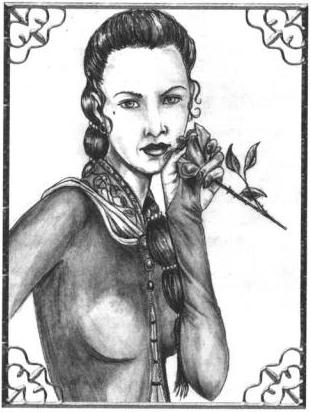Esclarmonde la Noir: Difference between revisions
(Created page with ";Paris -- medieval -DAV- Toreador [[]] <br> <br> '''Sobriquet:''' '''Appearance:''' '''Behavior:''' '''History:''' '''Recent Events:''' * -- '''Statistics'''") |
No edit summary |
||
| Line 1: | Line 1: | ||
;[[Paris -- medieval]] -DAV- [[Toreador]] | ;[[Paris -- medieval]] -DAV- [[Toreador]] | ||
[[]] | [[File:Toreador Esclarmonde.jpg]] | ||
<br> | <br> | ||
<br> | <br> | ||
| Line 9: | Line 9: | ||
'''Behavior:''' | '''Behavior:''' | ||
'''History:''' | '''History:''' Originally a noblewomen near the frontier to Iberia, Esclarmonde was Embraced during the Abd-er Rahman's campaigns against the Franks, and spent most of her time as a neonate in battle against invading Moorish vampires. As she had spent most of her mortal life in the shifting politics between the kingdoms of Toulouse, Aragon, and Aquitaine, she was no stranger to the power-politics within the Courts of Love, although she found most of her Frankish peers boring and crude. | ||
She maintained nominal allegiance to Queen Salianna, but ruled her domain without much interference. Under her rulership, the Pyrenees became a haven for artists of all strands, be they Christian, Jewish, Cathars, or Muslims; even the differences between the High and Low Clans were ignored in favor of talented individuals. | |||
This proved to be a thorn in the side of her more conservative brethren. It was shortly after the massacre at Béziers, during the initial stages of the Crusade against the Cathars, that King Etienne accused Esclarmonde of treason and of conspiring with the Lasombra of Aragon. That she chose not to appear before the Grand Court to answer his charges only confirmed those charges in the minds of many. Although Etienne initially thought that Esclarmonde would soon falter, he was taken by surprise by her knowledge of warfare. | |||
Esclarmonde provoked numerous conflicts between mortal crusaders, invading vampires and native Lupines to distract her enemies, while she used a combination of swift diplomacy and her own martial skill to seek allies from the Iberian Lasombra and several of the wandering Low Clans. Other Cainites within the Courts of Love, such as the Ventrue Countess Saviarre, came to support Esclarmonde in her struggle, further deepening the crisis. | |||
After the crusaders took Toulouse, many of the mortal and undead natives resisted, leading to various revolts up to 1225. The internal war within the Courts of Love crippled its infrastructure and when the Inquisition arose from the ashes of the Albigensian Crusade, the former homelands of the first heresy invited special scrutiny, leading to the death of many native Cainites. Esclarmonde's Final Death was never confirmed, but seemed to be the most likely outcome. | |||
'''Recent Events:''' | '''Recent Events:''' | ||
* -- '''[[Statistics]]''' | * -- '''[[Esclarmonde la Noir's Statistics]]''' | ||
Latest revision as of 14:20, 22 September 2018
- Paris -- medieval -DAV- Toreador
Appearance:
Behavior:
History: Originally a noblewomen near the frontier to Iberia, Esclarmonde was Embraced during the Abd-er Rahman's campaigns against the Franks, and spent most of her time as a neonate in battle against invading Moorish vampires. As she had spent most of her mortal life in the shifting politics between the kingdoms of Toulouse, Aragon, and Aquitaine, she was no stranger to the power-politics within the Courts of Love, although she found most of her Frankish peers boring and crude.
She maintained nominal allegiance to Queen Salianna, but ruled her domain without much interference. Under her rulership, the Pyrenees became a haven for artists of all strands, be they Christian, Jewish, Cathars, or Muslims; even the differences between the High and Low Clans were ignored in favor of talented individuals.
This proved to be a thorn in the side of her more conservative brethren. It was shortly after the massacre at Béziers, during the initial stages of the Crusade against the Cathars, that King Etienne accused Esclarmonde of treason and of conspiring with the Lasombra of Aragon. That she chose not to appear before the Grand Court to answer his charges only confirmed those charges in the minds of many. Although Etienne initially thought that Esclarmonde would soon falter, he was taken by surprise by her knowledge of warfare.
Esclarmonde provoked numerous conflicts between mortal crusaders, invading vampires and native Lupines to distract her enemies, while she used a combination of swift diplomacy and her own martial skill to seek allies from the Iberian Lasombra and several of the wandering Low Clans. Other Cainites within the Courts of Love, such as the Ventrue Countess Saviarre, came to support Esclarmonde in her struggle, further deepening the crisis.
After the crusaders took Toulouse, many of the mortal and undead natives resisted, leading to various revolts up to 1225. The internal war within the Courts of Love crippled its infrastructure and when the Inquisition arose from the ashes of the Albigensian Crusade, the former homelands of the first heresy invited special scrutiny, leading to the death of many native Cainites. Esclarmonde's Final Death was never confirmed, but seemed to be the most likely outcome.
Recent Events:
